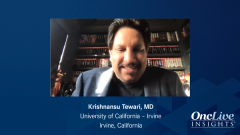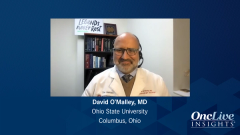
I/O + Chemotherapy Treatments for Endometrial Carcinoma
A review of data from several clinical trials on the use of I/O + chemotherapy as treatment for endometrial carcinoma.
Episodes in this series

Bradley Monk, MD, FACOG, FACS: This patient recurs; she’s chemotherapy-naïve, so she’s in the second bucket of stage IV recurrent, and chemotherapy is the standard. We’re doing some studies in this setting, adding a checkpoint inhibitor to the chemotherapy backbone. Does either one of you want to review those studies where we add chemotherapy and I/O [immuno-oncology] together? There are at least 3 of them that I can think of.
David O’Malley, MD: We’ve already talked about the KEYNOTE-B21 trial, which was for regional metastases or adjuvant therapy. This includes patients without measurable disease, or whose lymph nodes have been removed; they were positive. We have the completed LEAP-001 trial, which is a very interesting trial, looking at lenvatinib with pembro [pembrolizumab] versus standard chemotherapy in the first-line setting. It’s not in the regional, but in the first line, so that’s a little out of scope. We also havethe NRG-GY018 trial, which also looks at a chemotherapy backbone of paclitaxel and carboplatin, plus or minus pembrolizumab.
Krishnansu Tewari, MD: Were you going to mention the RUBY trial?
David O’Malley, MD: I was getting there; we have so many trials. We have the GY018 trial. I have to put a plug in—I know we’re talking about advanced disease, but we didn’t talk about high intermediate risk and patients who are MSI [microsatellite instability]-high with regard to regional radiation, vaginal cuff or whole pelvic, plus or minus pembrolizumab. Now as we look at this, we have the RUBY trial, DUO-E, and the AtTEnd trial for metastatic stage IV or recurrent patients.
Bradley Monk, MD, FACOG, FACS: I want the audience to really understand what we’re talking about. With stage IV recurrent, chemotherapy is the standard, and you have 4 studies that add 4 checkpoint inhibitors to it. The GY018 trial adds pembrolizumab, the RUBY trial adds dostarlimab, DUO-E adds durvalumab, and AtTEnd adds atezolizumab. You have 4 very similar studies, and some of them are done and the others are close to done. Someday, we’re going to be able to tell you that chemotherapy is the standard because adding a checkpoint inhibitor doesn’t work, or we’ll change it.
The other option is chemotherapy-free, and there are 2 studies in the chemotherapy-free stage IV recurrent. You said pembrolizumab and lenvatinib, the LEAP-001 trial, and the C93 trial, which was pembrolizumab alone in the MSI-high subgroup. The third paradigm, since these companies that make checkpoint inhibitors make PARP inhibitors, they say if you’re going to have a chemotherapy-I/O backbone, then you should add a PARP because I guess they’re platinum-sensitive and that’s a biomarker in ovarian cancer. The RUBY trial adds niraparib to the dostarlimab in the maintenance phase, and the DUO-E trial adds olaparib to durvalumab in the maintenance phase. It’s very exciting, and that’s what I would treat this patient with who has liver metastases, unless she was MSI-high. If she was MSI-high, then I would put her on the C93 trial, which would be chemotherapy versus pembrolizumab alone. What do you think, Krish?
Krishnansu Tewari, MD: I like it. I think pembrolizumab and lenvatinib, outside of a clinical trial, is what this patient should go on.
Bradley Monk, MD, FACOG, FACS: That is if she’s not MSI-high.
David O’Malley, MD: What happens if she can’t go on a clinical trial? You know we have those patients; they have melanoma that was diagnosed a year ago, right?
Krishnansu Tewari, MD: If there’s no clinical trial that she’s eligible to participate in, or if she has liver metastases, she’s MSI-stable, we would put her on pembrolizumab plus lenvatinib.
David O’Malley, MD: But she is MSI-high.
Bradley Monk, MD, FACOG, FACS: This patient is chemotherapy-naïve, so this patient is going to get chemotherapy at this point. She will get pembrolizumab and lenvatinib in the second line. But I think outside of a clinical trial in first-line metastatic disease or stage IV, I’ve used immune therapy plus chemotherapy. It’s not FDA approved, and if they’re MSI-high, you want to do it. I’ve been able to get drug replacement. I have another patient who’s not MSI-high, and I offered the RUBY trial. The RUBY trial, again, is chemotherapy with or without dostarlimab. That patient said, “You know, I think I’ll just buy the dostarlimab.”
The patient in this case has a uterine serous cancer, and that’s not an MSI-high situation; she’s just finished her 3 doses. There was widely metastatic disease, she presented with a spinal lesion, and she’s responding. Is the dostarlimab adding to it? I’m not sure, and that’s what the RUBY trial will answer. To this other patient’s point, this guy has done very well from a financial standpoint. He said, “Look, Monk, you wouldn’t be doing 4 studies if there wasn’t a good reason to do it. You wouldn’t be doing it if you didn’t believe in it."
Transcript edited for clarity.






































